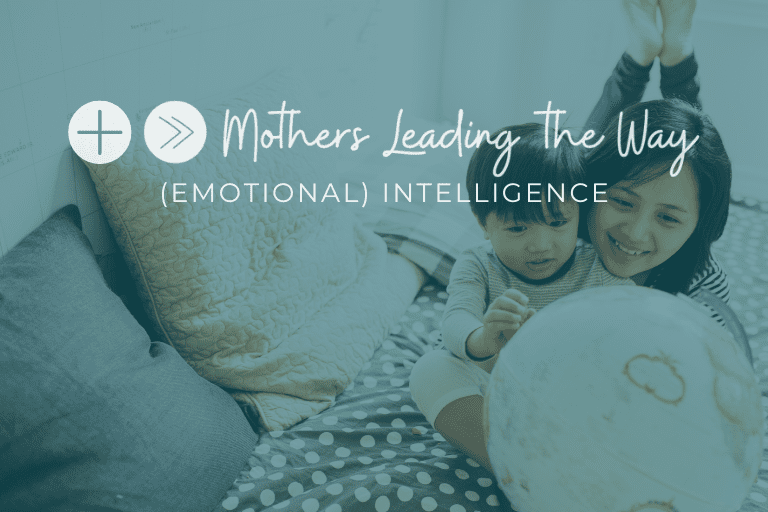Part 4: Teaching Children Emotional and Self-Intelligence
“Hey there, supermoms! Yes, you…even if your cape feels a little battered. Welcome back to our blog series, where we’re turning parenting challenges into triumphs with a sprinkle of humor and a lot of love. Today, we’re talking about something that might just be more crucial than teaching our kids to tie their shoelaces – nurturing their emotional and self-intelligence. Imagine a world where our kiddos not only recognize their feelings but also manage them like tiny mindfulness gurus. We’re not just raising kids; we’re nurturing future leaders, innovators, and, let’s be honest, adults who won’t melt down when they can’t find their favorite socks. So, buckle up as we dive into why boosting these skills in our children is as essential as those never-ending snacks they ask for!”
As a reminder, emotional and self-intelligence are the secret sauce in our kiddos’ growth recipe. These skills are like the Swiss Army knife for life. They equip our kids with the ability to understand and express their feelings, handle the playground’s highs and lows, and navigate the world with empathy and insight. By fostering these abilities, we’re not just prepping them for school or playdates; we’re setting them up for success in every aspect of their future lives – from acing job interviews to building healthy relationships. It’s like giving them a toolbox for life, minus the actual hammer and nails!
So, how can we teach these skills?
Emotional Intelligence:
First, teaching empathy is about leading by example. When children see their parents understanding and respecting others’ feelings, they learn to do the same. Engaging in conversations about emotions, like discussing characters’ feelings in stories, can further this understanding. Secondly, encouraging emotional expression involves creating a safe space for children to share their feelings without fear of judgment and validating these emotions as normal and important.
We can definitely make this fun. If your child sees a classmate in tears, cue the “empathy detective” game. They get to guess why their friend is upset and brainstorm superhero-style solutions. Role-playing can allow them to be both the superhero and the one saved, which definitely builds their empathy muscles.
Don’t forget to encourage emotional expression: Implement a daily ‘Feelings Fiesta’ where your child can draw or chat about their rollercoaster of feelings. Didn’t get a turn on the swing? Let’s draw it out and chat about taking turns and sharing – it’s like mini-therapy with crayons!
Self-Intelligence:
To foster self-awareness in children, involve them in reflective activities like discussing their day and identifying what they felt and why. This helps them connect actions with emotions. A fun way to do this is with an ‘Operation Emotion Journal.’ After a big day, like a sports extravaganza, kids can play junior detective, unraveling the mystery of their feelings in their journals. It’s like a secret diary, but for emotions!
Now, to build up their self-regulation skills, explore playful activities that require patience and control, like board games or team sports. Consider having a ‘Patience Olympics’ in which children practice their deep breathing superpowers when it is not their turn. Waiting patiently is like unlocking a new level in the game of patience, especially during moments of excitement or frustration.
Building Skills Across Ages:
As with our junk drawers and our toolboxes, our emotional and self-intelligence skills change as we age. In early childhood (ages 3-5), children start recognizing basic emotions in themselves and others, an initial step in emotional intelligence. By age 7 or 8, they begin understanding more complex emotions, and the concept of empathy starts to develop. Self-awareness also grows during this period as children start to identify their likes, dislikes, and personal strengths. As children enter adolescence (ages 13-18), their emotional intelligence further matures. They become capable of understanding and managing more complex emotional experiences, and their sense of self becomes more defined. Teenagers start to form their own values and beliefs, distinct from their parents, which is a crucial aspect of self-intelligence.
As moms, we need to consider what will fit your child’s developmental and individual needs. Let’s explore some specific examples.
Early Childhood (Ages 3-5): Picture this: Your toddler is having a meltdown because their banana broke. Instead of dismissing it as silly, acknowledge their feeling, “It’s frustrating when our food doesn’t look right, isn’t it?” This validates their emotions and helps them name what they’re feeling, a stepping stone in emotional intelligence. Then, have them draw a picture of the broken banana or do a broken banana dance. After all, it is hard to have a meltdown when you are giggling.
Elementary Age (Ages 6-12): Let’s say your child’s upset because a friend didn’t share a toy. You could say, “How do you think your friend felt?” encouraging them to consider others’ feelings. For self-awareness, explore different activities like soccer or painting and see what they gravitate towards – even if it means a few ‘abstract’ art pieces on your living room walls!
Adolescence (Ages 13-18): Teen years are all about identity. Encourage journaling or discussions about future aspirations, which could range from becoming the next pop star to a scientist. When they make choices, like a daring new hair color, support them (within reason) and discuss the outcomes, helping them navigate the complex world of emotions and self-identity. Remember that this is about their own exploration and development, so focus on listening rather than lecturing!
Conclusion:
Throughout this four-part series, we’ve explored the multifaceted nature of intelligence for working moms and their children. From understanding and applying emotional and self-intelligence in our lives to nurturing these qualities in our children, we’ve seen how these skills form the foundation for personal growth, effective parenting, and harmonious family dynamics. As we conclude, remember that this journey is ongoing, filled with learning opportunities for both you and your children.
References and further reading:
Brackett, M. A., Rivers, S. E., & Salovey, P. (2011). Emotional intelligence: Implications for personal, social, academic, and workplace success. Social and Personality Psychology Compass, 5(1), 88-103.
Elias, M. J., Parker, S. J., Kash, V. M., Weissberg, R. P., & O’Brien, M. U. (2008). Social and emotional learning, moral education, and character education: A comparative analysis and a view toward convergence. In Handbook of moral and character education (pp. 248-266). Routledge.

